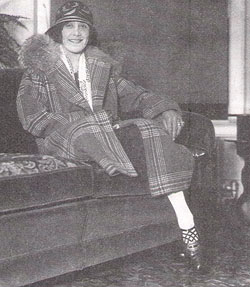The New Rochelle, New York annulment trial of Leonard “Kip” Rhinelander and his wife, Alice Jones Rhinelander, was a much-publicized issue in the 1920s which highlighted white America’s definitions of race, class, and marriage.
Alice Jones was the daughter of working-class English immigrants. Her mother was known to be white, while her father’s ancestry was “mixed.” Leonard “Kip” Rhinelander was descended from a wealthy, white New York family.
Rhinelander and Jones met in 1921, fell in love, and married in 1924. Because of the Rhinelander family prestige, the union soon became public. In the social atmosphere of the 1920s, it was scandalous that Rhinelander would marry a woman of lower socioeconomic class, or who possessed any “non-white” blood. Rhinelander’s father pushed the annulment lawsuit brought by his son only weeks after the wedding, in which Rhinelander, Jr. charged Mrs. Rhinelander with deceiving him as to her race. The prosecution argued that if Leonard had known she was “not white,” he would not have married Alice. A leading issue in the trial thus became what Alice Rhinelander’s true race was, bringing into sharp focus the arbitrary nature of white America’s obsession with racial classification during that period.
Attorneys on each side attempted to answer this question using Alice Jones Rhinelander’s social network, her father’s ancestry, and even her language as evidence of her racial status. The Rhinelander attorneys attempted to paint Leonard as a “dupe” victimized by a “vamp,” playing on sexualized stereotypes of African American women, while defense counsel resorted to desperate means to prove that Rhinelander must have known his bride was not “white” when they induced a stricken Alice to disrobe before the jury.
The Rhinelander Trial held the public in its grip for the better part of 1925, with both black and white press weighing in with varying opinions. Ultimately, on December 6, 1925, the jury ruled in Mrs. Rhinelander’s favor. Playing on the notion that race can be visually established, the defense attorney successfully “showed” Mrs. Rhinelander to be “colored,” argued that she could not have deceived her husband, and therefore his claims for annulment were invalid.
The couple never reunited, and legally separated in 1930. Leonard Rhinelander died in 1936, and Alice died in 1989.

